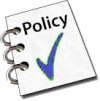Difference between revisions of "Wikispooks:Templates"
m |
m (Text replacement - "WikiSpooks" to "Wikispooks") |
||
| (10 intermediate revisions by the same user not shown) | |||
| Line 1: | Line 1: | ||
{{HelpSection|image=Policy.png}} | {{HelpSection|image=Policy.png}} | ||
| − | [[Help: | + | Mediawiki's system of [[Help:templates|templates]] provides a convenient macro-language to allow efficient re-use of material and standardisation of presentation. This page assumes that you are already familiar with them and gives a quick overview of how they are currently used on Wikispooks. |
==Single Issue Templates== | ==Single Issue Templates== | ||
| − | Wikispooks has some content-specific templates (i.e. relating to a particular page or couple of pages), mostly of a fairly simple nature - i.e. a badge or a list of links. These are gradually being replaced by {{SMW}}-based approaches which have shown themselves easier to maintain and generalise upon, so ''Single Issue Templates are deprecated as of January 2014'' - although they can still be used if available, it is not recommended to create any more. {{ | + | Wikispooks has some content-specific templates (i.e. relating to a particular page or couple of pages), mostly of a fairly simple nature - i.e. a badge or a list of links. These are gradually being replaced by {{SMW}}-based approaches which have shown themselves easier to maintain and generalise upon, so ''Single Issue Templates are deprecated as of January 2014'' - although they can still be used if available, it is not recommended to create any more. {{DebateHere}} |
==Semantic Templates== | ==Semantic Templates== | ||
| − | {{FA| | + | {{FA|Wikispooks:Semantic Templates}} |
| − | Wikispooks uses the [[ | + | Wikispooks uses the [[Wikispooks:Semantic Mediawiki|Semantic Mediawiki]] extension to allow integration of machine readable with human readable content. This is done exclusively through so-called 'Semantic Templates' as opposed to those that only handle human readable text, layout information, images etc. |
| − | {{ | + | ==Parameters== |
| + | Wikispooks-authored templates<ref>This standard does not apply to templates imported elsewhere (e.g. from [[Wikipedia]]). For simplicity and maintainability these should be left as they are. Name collisions are dealt with on an ad hoc basis - something which has not proved difficult so far.</ref> should follow a [[Wikispooks:standardisation|standard]] set in June 2014. Parameters must be of in lower case, connected by underscores if they consist of multiple words. - e.g. "birth_date". Numerical parameters are given with formatting (so "1000", not "1,000") and generally devoid of units, but size parameters should be with 'px', (so "440px", not "440"). Capital letters are reserved for future use; the only currently approved use of capitals is the prefix "ON_" which indicates parameters that set {{on}}-specific data. As of 2017 2016, there may still be one or two templates do not yet follow this standard completely. | ||
| + | |||
| + | ==Problems== | ||
| + | If you discover a problem with a Wikispooks template, please report it by adding [[Template:TemplateProblem]] at the top of the template page. | ||
| + | {{Wikispooks Footer/Policy}} | ||
[[Category:Templates| ]] | [[Category:Templates| ]] | ||
Latest revision as of 17:12, 14 October 2018

Mediawiki's system of templates provides a convenient macro-language to allow efficient re-use of material and standardisation of presentation. This page assumes that you are already familiar with them and gives a quick overview of how they are currently used on Wikispooks.
Single Issue Templates
Wikispooks has some content-specific templates (i.e. relating to a particular page or couple of pages), mostly of a fairly simple nature - i.e. a badge or a list of links. These are gradually being replaced by SMW-based approaches which have shown themselves easier to maintain and generalise upon, so Single Issue Templates are deprecated as of January 2014 - although they can still be used if available, it is not recommended to create any more. Use the discussion page to start a debate about this.
Semantic Templates
- Full article: Wikispooks:Semantic Templates
- Full article: Wikispooks:Semantic Templates
Wikispooks uses the Semantic Mediawiki extension to allow integration of machine readable with human readable content. This is done exclusively through so-called 'Semantic Templates' as opposed to those that only handle human readable text, layout information, images etc.
Parameters
Wikispooks-authored templates[1] should follow a standard set in June 2014. Parameters must be of in lower case, connected by underscores if they consist of multiple words. - e.g. "birth_date". Numerical parameters are given with formatting (so "1000", not "1,000") and generally devoid of units, but size parameters should be with 'px', (so "440px", not "440"). Capital letters are reserved for future use; the only currently approved use of capitals is the prefix "ON_" which indicates parameters that set official narrative-specific data. As of 2017 2016, there may still be one or two templates do not yet follow this standard completely.
Problems
If you discover a problem with a Wikispooks template, please report it by adding Template:TemplateProblem at the top of the template page.
| ||||||
|





